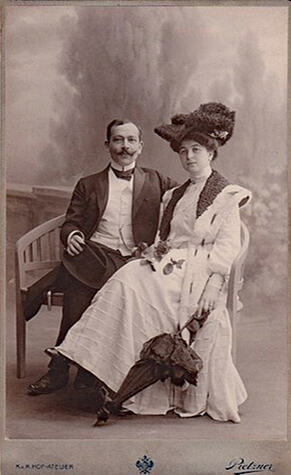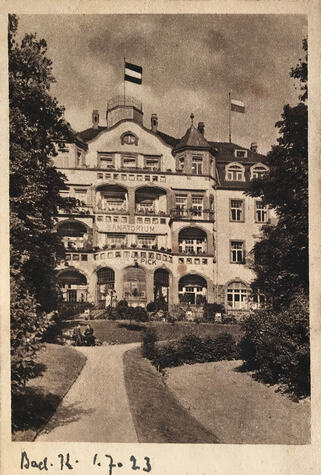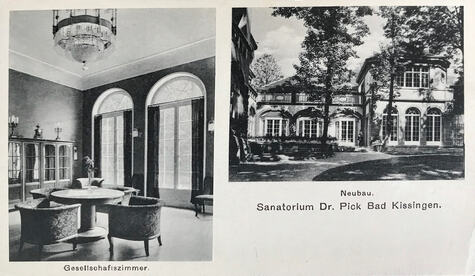personal data
Pick Bertha
Parents: Jakob Hammerstein and Frieda née Wolff
Siblings: Hans Ludwig, Erich, Gertrud Rosa Adele m. Rosenhain
Spouse: Dr. Arthur Pick
Children: Vera Ruth, Werner Rolf Theodor,
Kurhausstraße 6 (older count - today 11)
Early 1939 emigrated to U.K.
biography
Bertha Pick, née Hammerstein, was born in Stettin/Szczecin in West Pomeranian (now Poland) on July 15, 1884, as the daughter of the magistrate Jakob Hammerstein and his wife Frieda Wolff. The Hammerstein family came from East Prussia and Bertha’s mother was the daughter of a furniture salesman from Leipzig. Both the Hammersteins and the Wolffs continued being Jewish but didn’t actually practice it actively.

When Bertha Hammerstein, who was 19 then, accompanied her grandmother during a spa visit to Carlsbad, she got acquainted with Dr Arthur Pick who practiced as a spa doctor. They fell in love and married in Szczecin in October 1905. Arthur Pick had Jewish ancestors but had already been baptized a Protestant Christian when he was a child. Therefore - presumably because of practical considerations – she also got baptized as a Christian before her marriage. The Protestant pastor who married the two of them and had baptized Bertha before had advised her “to preserve her Jewish heart”. How small a role dogmatism played for the Hammersteins in questions of faith can also be derived from Jakob Hammerstein’s attitude. The aforementioned local Protestant pastor was a close friend of his who had also held his funeral and given the eulogy. Even though Bertha’s father hadn’t converted to Christianity. After their marriage Bertha moved to her husband in Carlsbad. A year later, their daughter Vera was born in Charlottenburg.
At the end of 1908, the family moved to Bad Kissingen and took over the sanatorium in Kurhausstrasse 6 (old number – now 11) from Dr Manfred Bial. In the following years, Dr Arthur Pick and his wife Bertha established an internationally acknowledged sanatorium for cardiovascular, stomach and intestinal diseases, nervous as well as metabolic and eating disorders. As its chief doctor, Bertha’s husband was responsible for the medical management of the sanatorium, whereas she managed the house and the kitchen, which as a matter of course played an important role in such an establishment and was highly esteemed.
In 1913, their son Werner Rolf Theodor was born in the spa town. Even though there was little time left for a normal family life during the spa season as the parents had to give their full attention to the running of the sanatorium and the guests, Bertha lovingly cared for her children. For example, in the summer, she took them for a swim in the Saale River nearby before breakfast. Bertha Pick and her husband did not have much of a social life. At the end of the season there were a few dinner parties with other doctors, but during the season everybody was too busy for socialising. (ibid). The Picks often spent the winter months in the Alps (Oberstdorf, Garmisch-Partenkirchen, Berchtesgaden) where they rented a plain house and finally had time for a normal family life.
In 1916, Bertha Pick - together with her husband and the two children – got Bavarian citizenship according to the law ruling citizenship in the Reich (Reichs- und Staatsangehörigkeitsgesetz) as she had been a citizen of Hungary-Austria since 1905, the year of her marriage with Dr Pick. The application was supported by the town of Bad Kissingen and the Bavarian authorities, the Royal Government of Lower Franconia and Aschaffenburg in Würzburg in the middle of World War I in 1016.

|
|
Up to the middle of the 1920s, the running of the sanatorium was very successful, and the family enjoyed the wealth of the house. When after the costly modernization of the estate in 1923/24 since the beginning of the Great Depression and with the increase of anti-Semitism particularly more and more guests from abroad stayed away, the sanatorium got into great economic difficulties since 1930. Dr Pick couldn’t pay the banks any longer which caused backlogs and liabilities to continue increasing. In February 1934, the Picks lost their house in foreclosure proceedings to Süddeutsche Bodenkreditbank (Southern German ground loan bank).
Bertha Pick couldn’t be disheartened in spite of all the setbacks. In November 1933, the Picks left Bad Kissingen in the direction of Italy and planned to establish a guest house in Pieve/ Liguria. When that couldn’t be realized, they moved to Berlin. Bertha Pick opened a guest house there and her husband practiced as a doctor. Bertha’s guest house at Kurfürstendamm instantly turned a success. She succeeded to take all her linen, silverware, tableware and some furniture from Bad Kissingen to the Spree River. In 1934, life in Berlin still was rather bearable and there was quite a good atmosphere in the guest house.
In the following years, however, it became evident that they would have to emigrate sooner or later. Their son Werner who had emigrated to England already in November 1933 could convince his parents to leave Germany at last. He had visited them in Berlin in 1934 and Bertha and Arthur could also visit their son in England.
During her stay in London in 1936, Bertha started to explore the establishing of a guest house in London. The high esteem her guest house in Berlin enjoyed had been spread in the community of Jewish refugees and she was introduced to Lily Sachs, the owner of a guest house in Adamson Road 4, Swiss Cottage. They began to discuss the possibility of working together as there was a high demand of that kind of accommodation in which especially elderly members of the community of refugees could find a temporary or even permanent home. Her talent of running a house and offering a good cuisine completed those of Lily Sachs whose talents were more on the social side. In any case, the founding stone for a successful future was laid.
Bertha's husband Arthur didn’t go back to Germany after a visit to England of the two of them together in October 1938 and Bertha returned to Berlin again for a short stay to liquidate their guest house, before she also emigrated to London at the beginning of 1939.
Bertha Pick was an extremely pragmatic and viable person who never gave up and maintained her optimism throughout her life. Though she had to work hard in those days, she was always in a good mood and never complained (See Werner Pick, My Memoirs, Claygate 2002). Together with Lily Sachs she managed to establish a guest house in Adamson Road, a posh London district. It was instantly successful which enabled the family to live rather well in the difficult years of the war. This guest house, a so-called Boarding House served as a first starting point for German-speaking emigrants from the Third Reich, the former states of Austria and Czechoslovakia and other countries in Europa that had been occupied by Nazi Germany.
Bertha’s siblings also survived the Nazi era, whereas her 83-years old mother Frieda was deported from Berlin to Theresienstadt and died only few months later in November 1942 from the unspeakable living conditions in the camp.
After the war, Bertha Pick filed an application for the refunding of her sanatorium in Bad Kissingen, but without success. Eckhard König, the Pick’s lawyer had substantiated the legal action by the fact that the economic decline of the sanatorium since the end of the 1920s was due to the early anti-Semitism of the local NSDAP (National Socialist German Workers’ Party = Nazi party) which occurred much earlier than the “Machtergreifung” (seizure of power of the Nazis). This had led to the fact that the best-paying guests from abroad had stayed away. This had been the reason for the financial difficulties for the Picks, the owners of the sanatorium. In addition, the complaint accused the Süddeutsche Bodenkreditbank, which had demanded the foreclosure proceedings and had got the surcharge for the estate in 1934, to have pushed the foreclosure proceedings because of anti-Semitic motives. The value of the house had been considerably higher than the amount of the 175. 000 Reichsmark at the foreclosure proceedings.
The respondents repudiated the refund request and declared that the substantial indebtedness reached back to long before 1933 (The reason had been the renovation of the house in the middle of the 1920s.) and was not caused by a racist discrimination/ persecution. On the contrary, the foreclosure had entirely economic reasons and had been unavoidable according to the creditors. If it had been a non-Jewish debtor, the bank wouldn’t have acted differently in the face of the catastrophic economic situation of the sanatorium.
In the verdict of the compensation chamber of the district Court of Würzburg Bertha Pick’s request for compensation was repelled. As a reason was given that “no serious violation or unfair exploitation of the situation of the applicant such as racist prosecution could be proven”. In view of the exorbitant indebtedness (amount of debts 436.135 Reichsmark in the year 1932) and only few promising reorganization proposals on the part of the people who ran the sanatorium on the other hand there were “considerable generally valid reasons” that justified a foreclosure. Bertha Pick’s objection against the verdict was rejected by the Higher Regional Court of the Reparation Senate in Munich at the beginning of 1954.
Bertha’s husband Arthur could not practice as a doctor in England any longer for health reasons. He died in 1956 at the age of 84. Bertha was a loving grandmother for her grandchildren and still lived to experience the birth of her first great-grandchild before she died three months later in London in July 1963.
Her descendants who live in the United Kingdom regained German citizenship in 2021 (according to Art. 116 Abs. 2 Grundgesetz).
References
Meldeakten Stadt Bad Kissingen (Meldekarten, Familienbogen,Hausakte)
StAWü, WB IV JR 3442 Pick Bertha (früher JRSO)
Werner Pick, Memoirs, Claygate, August 2002 (The source was kindly provided by the Pick family)
Werner Pick, Aufsatz zum Verhältnis der Familie zum Judentum (The source was kindly provided by the Pick family)
Datenbank Genicom![]()
Bundesarchiv Koblenz, Gedenkbucheintrag Frieda Hammerstein ![]()
Photo credits
© Robert Pick
Back
